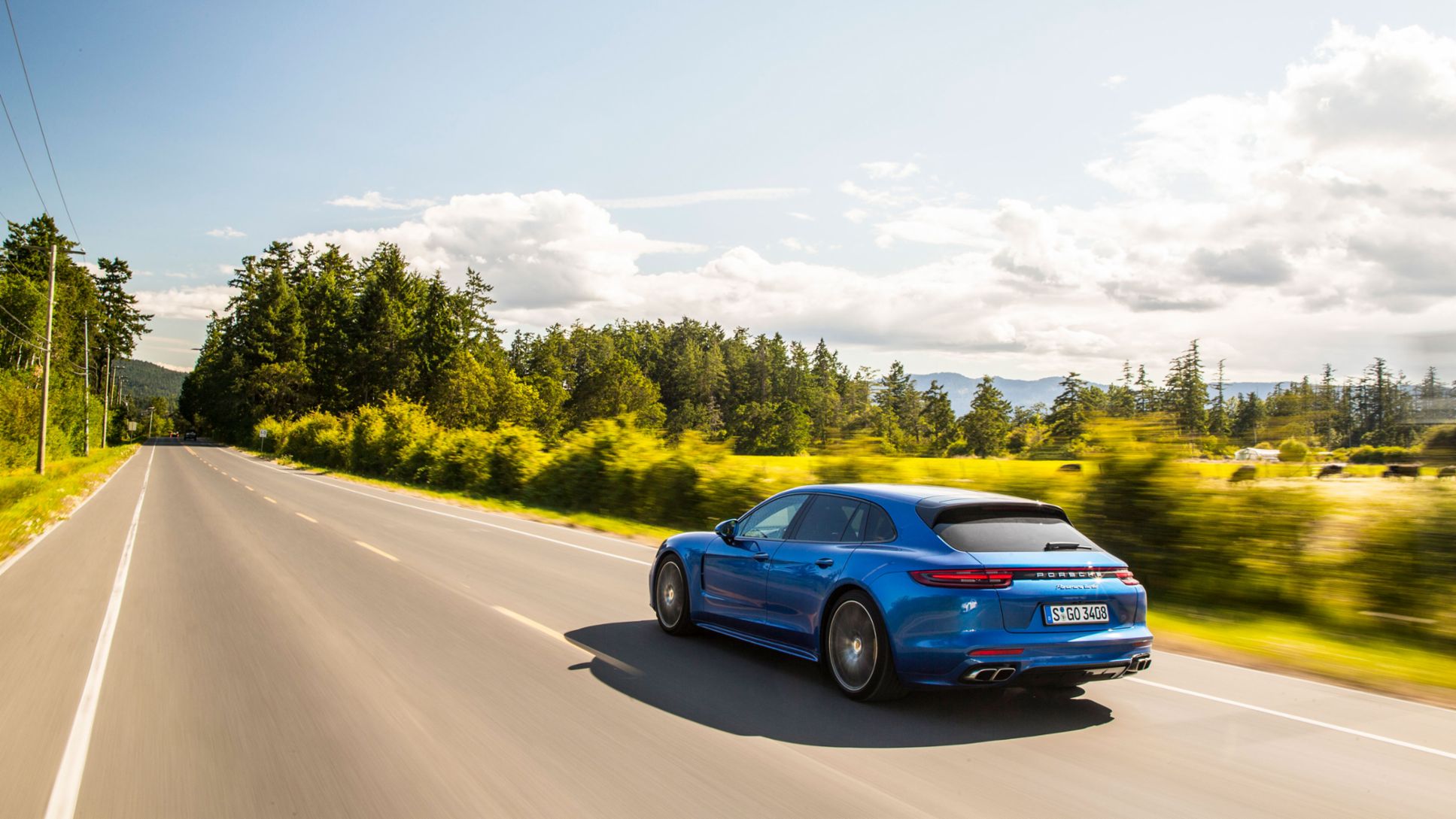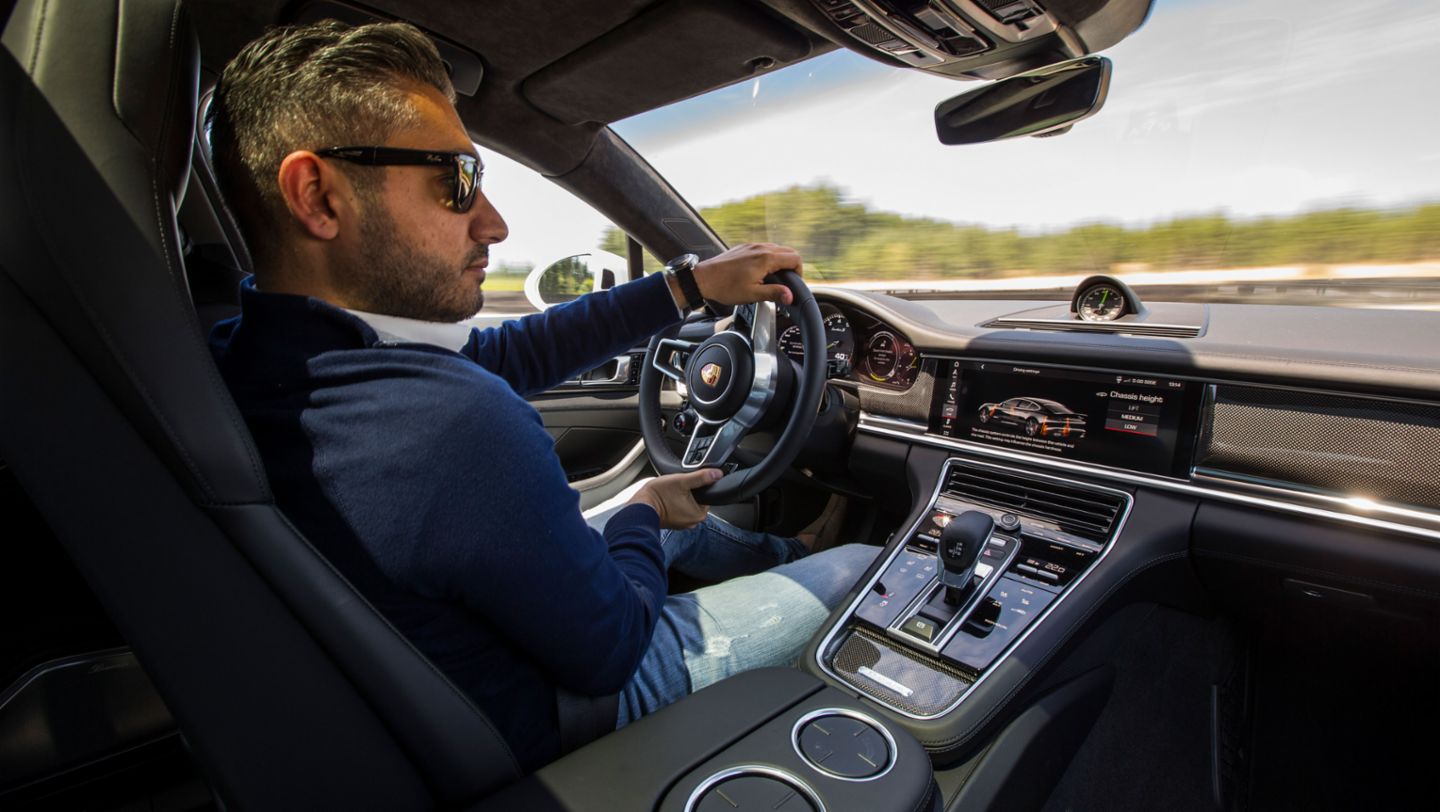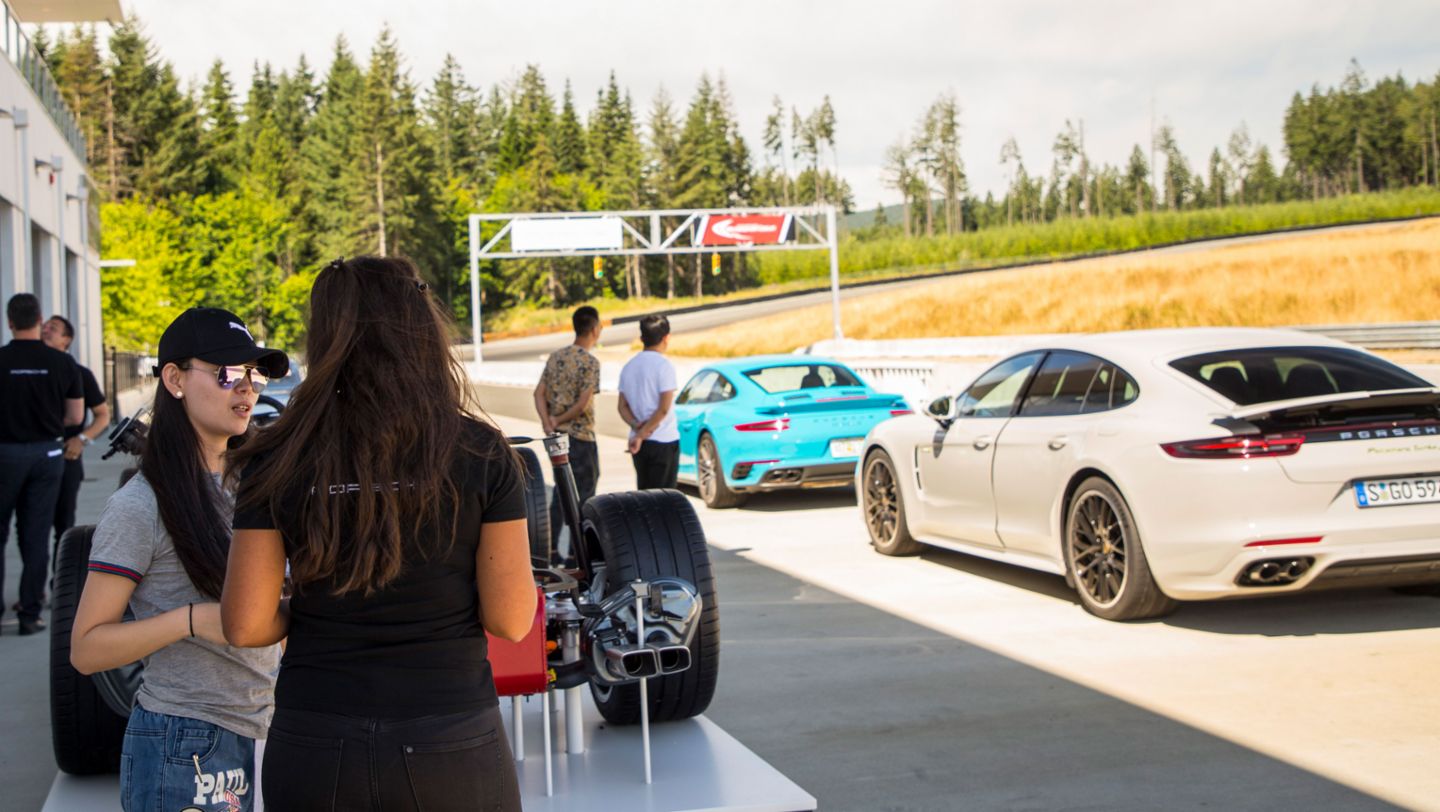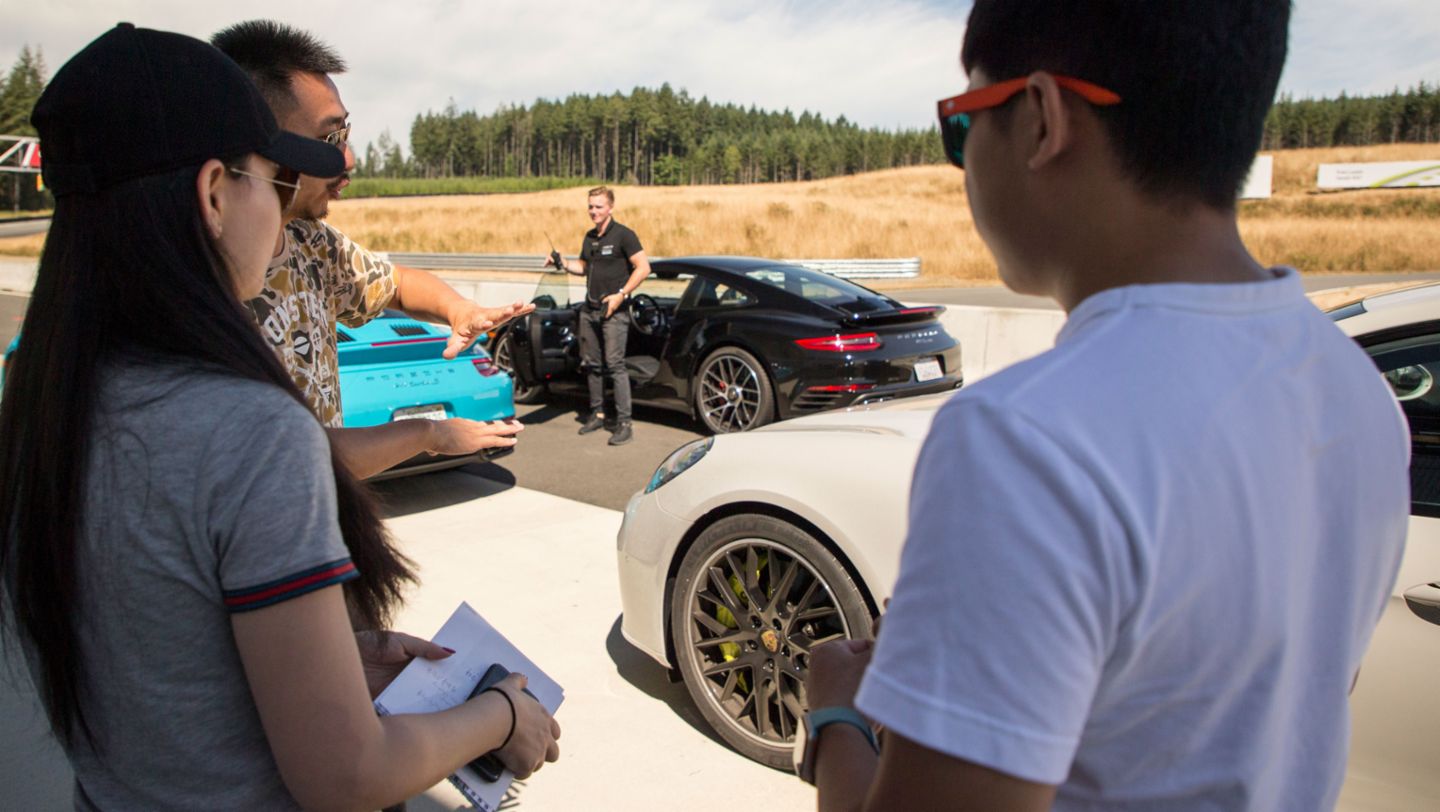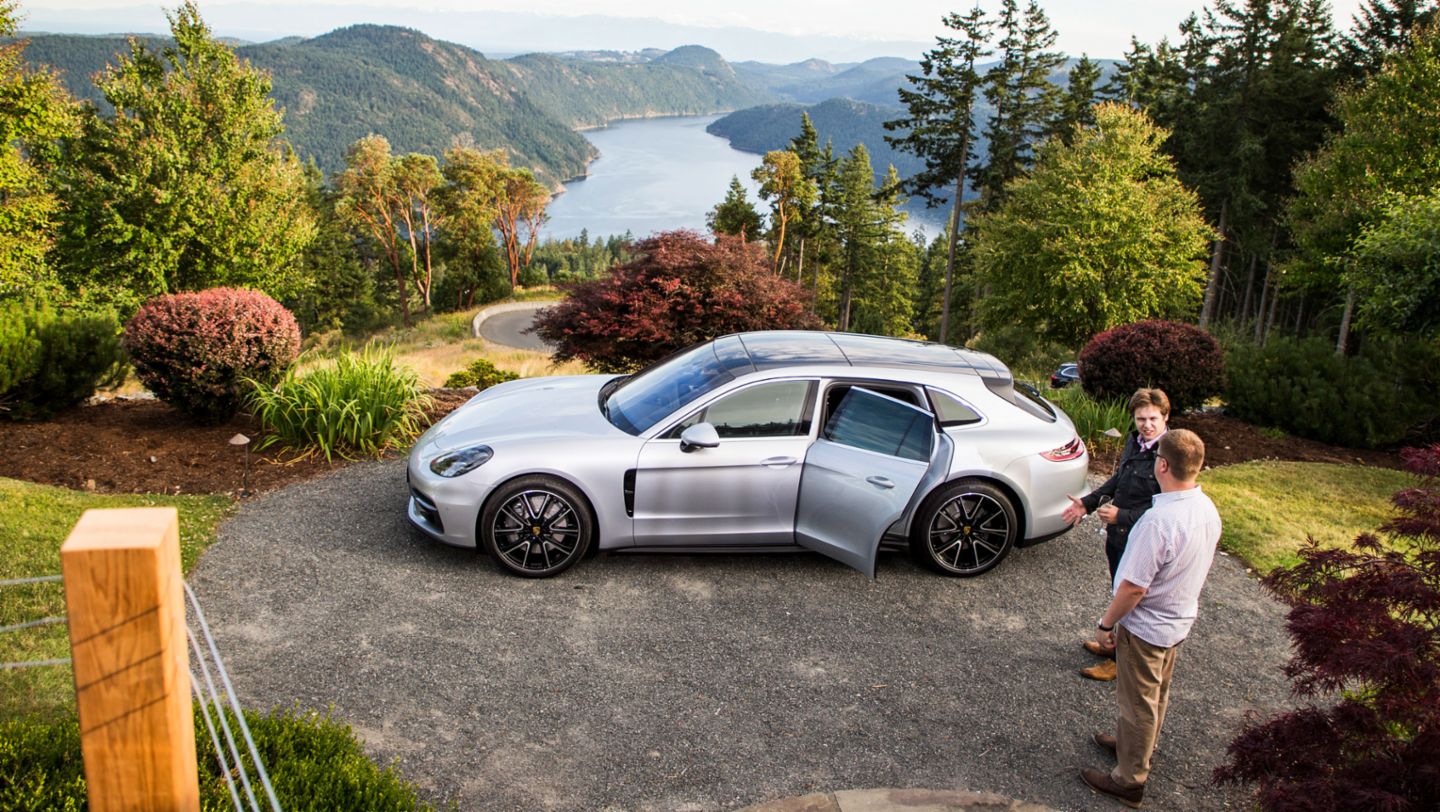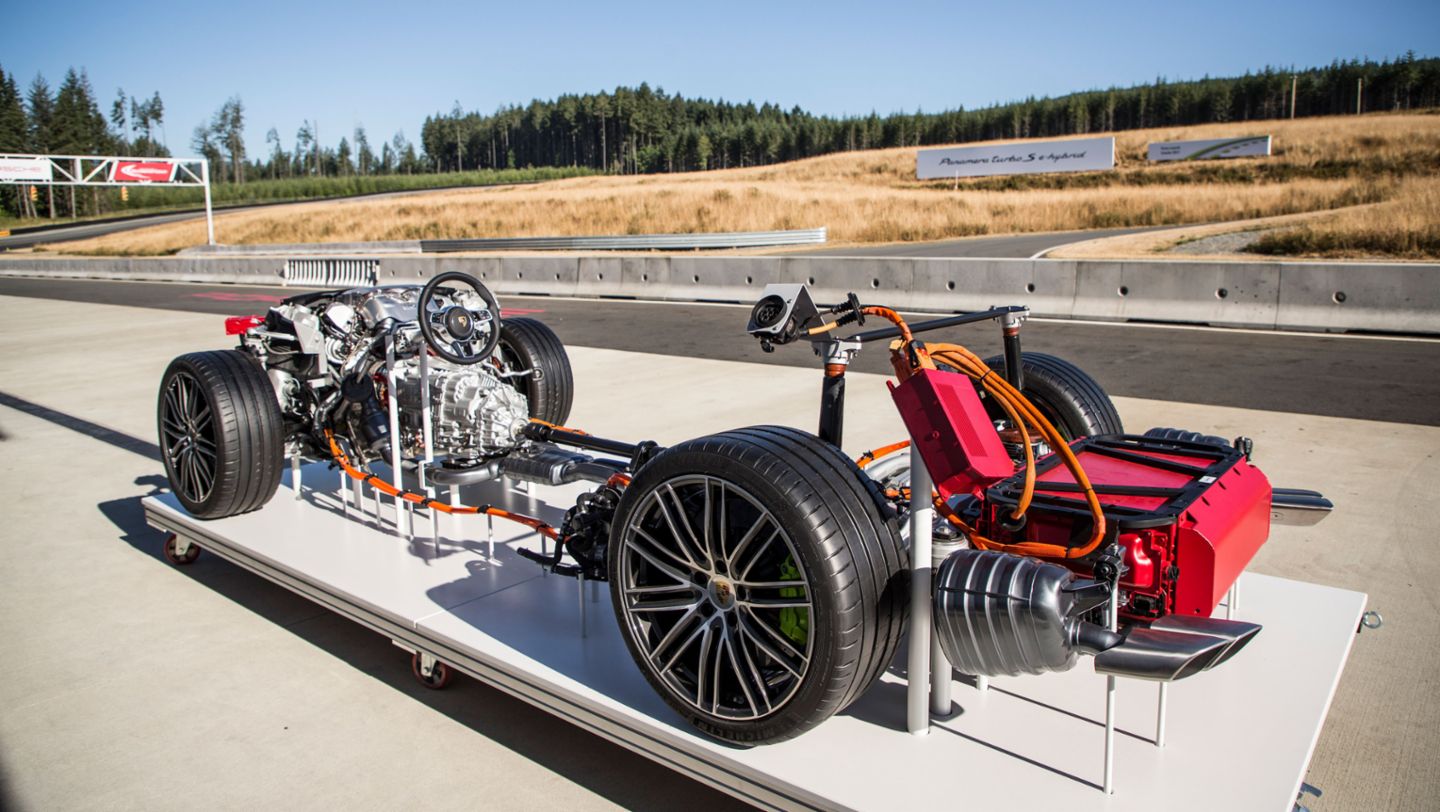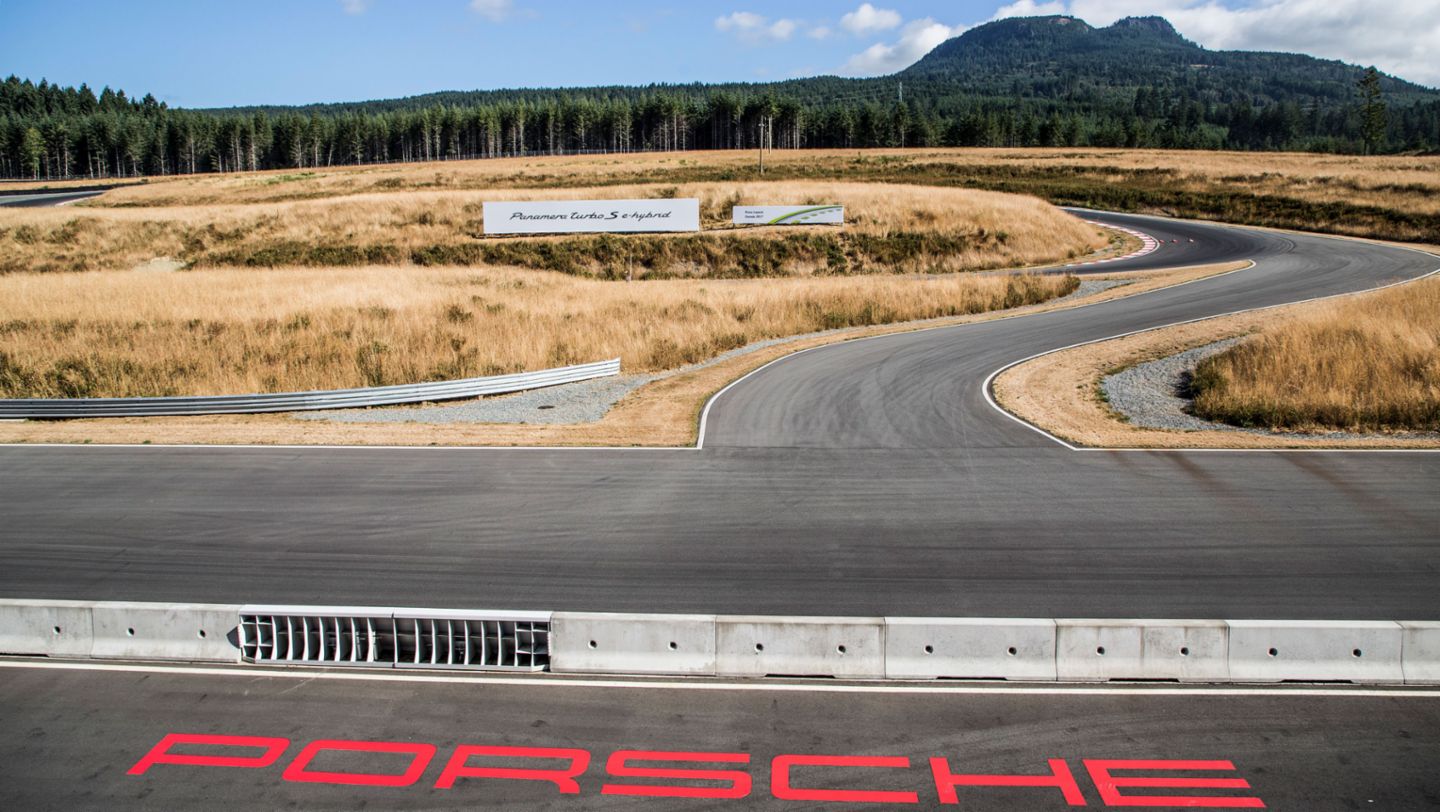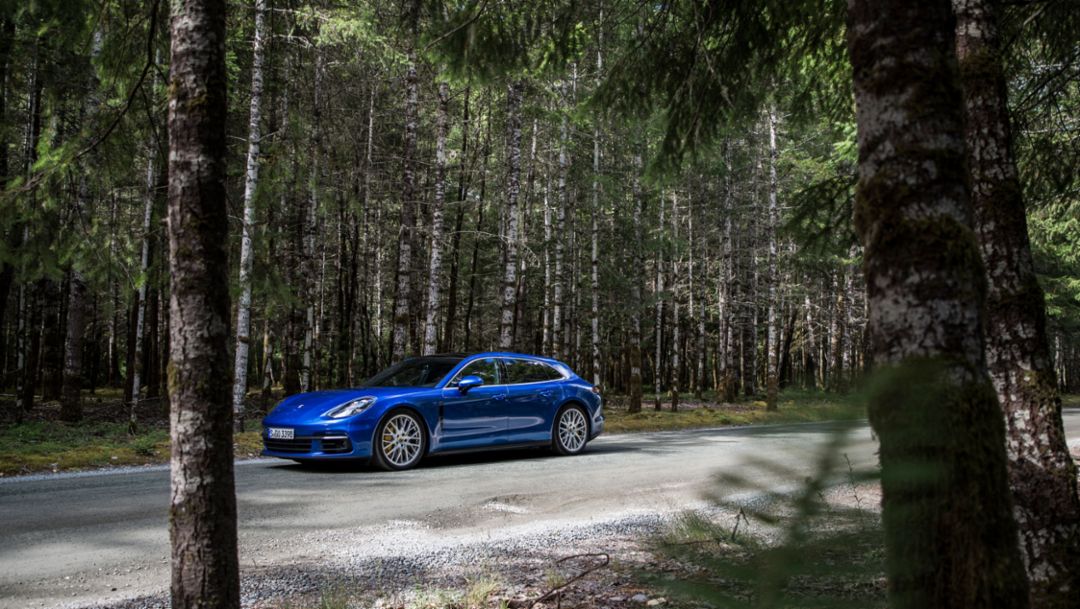Varied. This is the word that best describes the province of British Columbia. Alongside the endless kilometres of coastline with spectacular views and numerous offshore islands and bays, the long ranges of the Rockies and the Coast Mountains weave through British Columbia. An abundance of different species of animals thrives amongst the almost pristine natural landscape. By contrast, the major cities of Victoria and Vancouver are shaped by a modern urban cityscape.
Porsche chose this atmospheric location to introduce a vehicle that is just as varied as the surrounding landscape. The everyday usability and maximum flexibility of the new Panamera Sport Turismo can be seen in its large tailgate, low loading edge, increased luggage compartment volume and a 4+1 seating concept. At the same time, the Sport Turismo, with up to 404 kW/550 hp, (combined fuel consumption 9.5–9.4 l/100 km; CO2 emissions 217–215 g/km) is one of the sportiest vehicles of its kind.
Over the course of two weeks, over 300 journalists from 47 countries were given the opportunity to test the new model extensively. The powerful Panamera Turbo S E-Hybrid was also available for the media representatives to drive on the Vancouver Island Motorsport Circuit. Press reviews:
Panamera Sport Turismo
“The roofline does give a bit more rear headroom, but otherwise it’s all familiar Panamera, with a fine driving environment, neat finishes and easy operation of the infotainment functions and driving modes.“
autoexpress.com.uk
“Naturally the Sport Turismo Turbo puts all to shame in the performance stakes. Not only does it produce at least 100bhp more than the most powerful V6 turbo with 542bhp, its 568lb ft of torque is 236lb ft greater than the entry-level model and it produces 271bhp/ton (Fuel consumption combined 9.5 – 9.4 l/100 km; CO2 emissions 217 – 215 g/km). Little wonder Porsche claims it can reach 60mph in just 3.6-seconds (3.4 with Sport or Sport Plus), crack 100mph in 8.2-seconds in Sport Plus mode and top 189mph.”
evo.co.uk
“What’s the best-looking Porsche on sale today? That question just got tougher to answer, thanks to the 2018 Porsche Panamera Sport Turismo. It’s the third body style in the Panamera family following the standard sedan and the long-wheelbase Executive variant. It can carry more stuff compared to the standard Panamera, and it can fit five passengers, too—a first for Porsche’s luxury cruiser.”
motortrend.com
“But away from the inevitable trading of statistical might, few could find fault with the way the V8 (Fuel consumption combined 9.5 – 9.4 l/100 km; CO2 emissions 217 – 215 g/km) performs on the road. It responds quickly and with prodigious torque, revs smoothly and keenly, sounds authentic and drives through an eight-speed twin-clutch automatic gearbox that has just the right instincts about when to kick down and how to balance shift speed with refinement in manual mode.”
autocar.co.uk
“t’s as majestically refined and comfortable to drive as the standard Panamera Turbo, with no discernible difference. Quite how Porsche has made such forceful acceleration feel so relaxing I don’t know, but it would be many hours and hundreds upon hundreds of miles before you’d feel the least bit fatigued driving this.“
topgear.com
“Behind the wheel of the Turbo Sport Turismo, it’s easy to forget you’re driving a 2,035 kg station wagon. With 550hp (Fuel consumption combined 9.5 – 9.4 l/100 km; CO2 emissions 217 – 215 g/km) and 536 lb ft of torque, it’s a silken rocket ship. The PDK transmission responds in milliseconds, although hammering the throttle can induce a moment’s hesitation in downshift. Supple and pliant in normal mode, the Turbo Sport Turismo drives like a much smaller car. Switch to Sport Mode and the ride becomes a bit more punishing, but that’s mostly due to the enormous wheels and low profile tires on a really questionable road surface. Steering is linear and communicative and the wheel has just the right heft. Push the Turbo Sport hard, and it does an admirable job emulating a performance car, but it’s happiest as a grand tourer with stonking great gobs of power on reserve.”
driving.ca
“We’d call the Sport Turismo the hatchback version, except that wouldn’t differentiate it from the original Panamera body style. And Porsche might call it a wagon, but there’s no stodgier word in all of automotivedom. So Sport Turismo it is, an ambiguous yet suitably racy term for such a sexy shape. A near clone of a 2012 Paris auto-show concept car, the Sport Turismo is low, sleek, and powerful, with thicker D-pillars and more upright rear glass suggesting greater practicality.”
caranddriver.com
“It is really hard to find anything I dislike about the new Porsche Panamera Turbo Sport Turismo. All my feedback on the previous generation Panamera; mainly about the interior design and infotainment have been addressed and the good things including the sports car-like performance and handling are even better than before.”
gtspirit.com
“The Turbo model is still ludicrously fast. Over a looping backroad in the wilds of Vancouver Island, the Turbo variant of the Sport Turismo displayed sufficient thrust to turn that theoretical retriever into a two-dimensional laminate. Porsche claims 0-60 mph times of 3.6 seconds, or 3.4 if you've got the Sport Chrono option. Either way, the pairing of the 550 hp twin-turbo V8 (Fuel consumption combined 9.5 – 9.4 l/100 km; CO2 emissions 217 – 215 g/km) and the new eight-speed PDK produces vicious acceleration.“
roadandtrack.com
“Which is to say that the Sport Turismo can be both comfortable and sporty to drive at the same time, although we must admit that the temptation to drive the car faster than usual is less than wanting to be pampered in. Which, at times, makes it feel more 7-series than genuine Porsche to drive, but definitely un-Cayenne. This is one of the advantages estates have over SUVs when it comes to driving dynamic -- a key asset of Porsche.”
bangkokpost.com
“Trendy crossovers may rule the roost these days, but something as classically elegant as the shooting brake shape of the Panamera Sport Turismo is full of niche appeal, and is unlikely to go out of style. I can’t think of a better all-rounder in the motoring world. And within Porsche’s world, there’s nothing that does it all as well as the Sport Turismo.”
businesstimes.com
Panamera Turbo S E-Hybrid
„We’re used to thinking about plug-in hybrid cars as fuel-saving commuters, but the new Porsche Panamera Turbo S E-Hybrid is actually the most powerful saloon car the brand has ever built. The range already features electric power in the form of the Panamera 4 E-Hybrid, but that uses V6 power - this new version is built around the powerful V8 (Panamera Turbo S E-Hybrid: Fuel consumption combined 2.9 l/100 km; CO2 emissions 66 g/km; electricity consumption (combined) 16.2 kWh/100 km) from the Turbo model.“
autoexpress.co.uk
“As the replacement for the last-generation Panamera Turbo S range topper, the Turbo S E-Hybrid stands at the forefront of Porsche’s new, performance-oriented hybrid strategy. Alongside the 2015 Porsche 918 Spyder, it’s tasked with burnishing the credibility of gas-electric powertrains as performance aids.”
caranddriver.com
“The 2018 Panamera Turbo S E-Hybrid is an example of technology working right. The suspension and chassis components gave me added confidence on the track, while the hybrid powertrain boosts both efficiency and performance. It's a worthy car to sit at the top of the Panamera lineup.”
cars.com
„The Turbo S E-Hybrid takes the Panamera Turbo's already thunderous 550-horsepower, 4.0-liter twin-turbo V8 and mates it to a 136-horsepower electric motor, for a combined output of 680 horsepower (Panamera Turbo S E-Hybrid: Fuel consumption combined 2.9 l/100 km; CO2 emissions 66 g/km; electricity consumption (combined) 16.2 kWh/100 km) and 626 pound-feet of torque. That's a bit more than 200 horsepower shy of the 918, but a startling amount for any regular production car – let alone one that happens to be a hybrid.“
autoblog.com
Consumption data
911 Turbo S: Fuel consumption combined 9.1 l/100 km; CO2-emissions 212 g/km
Panamera 4S Diesel Sport Turismo: Fuel consumption combined 6.8 – 6.7 l/100 km; CO2 emissions 178 – 176 g/km
Panamera Turbo S E-Hybrid: Fuel consumption combined 2.9 l/100 km; CO2-emissions 66 g/km; electricity consumption (combined) 16.2 kWh/100 km
Panamera Turbo Sport Turismo: Fuel consumption combined 9.5 – 9.4 l/100 km; CO2-emissions 217 – 215 g/km
